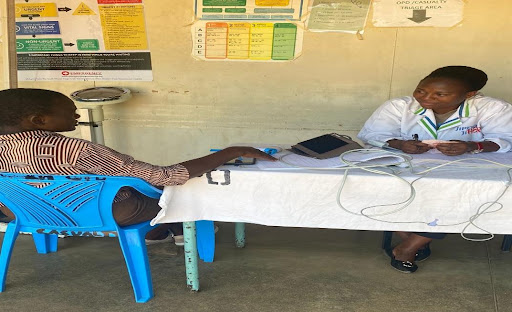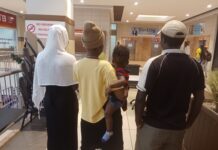By William Abala
Kisumu County: In the bustling city of Kisumu, Kenya, where the vibrant culture is celebrated and the heartbeat of the nation can be felt, there is a hidden struggle that often goes unnoticed.
Amid the lively streets and colorful markets, a community of deaf women and girls has been silently marginalized, their voices muted when it comes to their sexual and reproductive health rights (SRHR). Access to quality SRHR services remains a distant dream for many of them, despite the progress made in promoting SRHR in Kenya.
In Kisumu, Kenya, the battle for the sexual and reproductive health rights of deaf women and girls rages on.
On a global scale, the World Health Organization reports that 360 million people worldwide have disabling hearing loss, with 328 million adults and 32 million children affected. In Kenya, the 2019 census reveals that most of the 153,381 deaf individuals aged above 5 years reside in rural areas.
Unheard and Unseen: The Struggles of Deaf Women
When it comes to issues of SRHR, the deaf community in Kisumu faces an uphill battle. Privacy and confidentiality are virtually non-existent in health services for them. Imagine having to rely on a third person to explain what medical personnel are saying, robbing you of the dignity of understanding your own health. This lack of accessibility forces them to avoid health services altogether.
Moreover, the scarcity of sign language counseling exacerbates their challenges. Deaf women struggle to seek services such as Voluntary Testing and Counseling (VCT) and antenatal visits. In a society where communication is the key to information, these barriers leave the deaf community isolated and excluded.
The Right to Inclusion: Constitutional Promises vs. Reality
Kenya’s Constitution of 2010 proudly promotes the inclusion of people with disabilities in all aspects of life, including healthcare. Yet, the reality on the ground falls short of these promises. Sign language interpreters are a rarity in healthcare centers, leaving health workers guessing instead of ensuring precise communication with deaf patients. This not only obstructs access to SRHR services but also hinders family planning discussions.
The consequences are dire. Frustration and desperation lead some deaf individuals to completely avoid health centers. Additionally, parents and families are ill-equipped to share SRHR information with deaf adolescents and youth, perpetuating discrimination and limiting access to crucial knowledge and care.
Positive Initiatives in Kisumu:
At Kisumu County Referral Hospital (KCRH) and Jaramogi Oginga Odinga Teaching and Referral Hospital (JOOTRH), the transformation is palpable. These institutions have taken bold steps to create safe and inclusive spaces for the deaf community in Kisumu. Among the unsung heroes facilitating this change are the sign language interpreters, individuals who have become a lifeline for many.

Nancy Charo, a dedicated sign language interpreter at Kisumu County Referral Hospital (KCRH), stands as a beacon of hope for the deaf community in Kisumu. Positioned at the heart of the hospital’s outpatient department, she embodies the transformative power of inclusivity and communication.
Charo’s role extends beyond the confines of a single department; she is a mobile force, ready to bridge the communication gap wherever her services are required within the hospital’s walls. Her mission is clear – to ensure that no deaf patient is left unheard or misunderstood.
According to Charo, a sign language interpreter at KCRH, “Every day, I witness the impact of our efforts. Deaf individuals come to us with a sense of trepidation, but as soon as they realize they can express themselves and understand their healthcare providers, their faces light up. It’s about empowerment, and it’s about dignity. We are breaking the silence, one sign at a time.”
In the bustling corridors of KCRH, Nancy Charo represents not only a lifeline for the deaf community but also a symbol of progress and inclusivity. Her presence signifies that healthcare is becoming more than just a service; it’s a human right for all, regardless of their hearing ability.
Florence, a 26-year-old deaf woman from Kisumu, reflects on her journey from the past to the present. With a soft smile on her face, she speaks about the challenges she faced before sign language interpreters became a crucial part of KCRH’s healthcare system.
“In the past,” Florence shares, “going to the hospital was an ordeal. It felt like venturing into an unfamiliar world where communication was a constant struggle. I often felt isolated, like my voice didn’t matter.”
She recalls the frustration of trying to convey her symptoms or understand medical advice, only to be met with blank stares or misinterpretations. “There were times,” she continues, “when I simply gave up on seeking healthcare because the experience was so disheartening. It seemed like healthcare was a privilege I couldn’t access.”
However, today, seated beside a sign language interpreter at KCRH, Florence’s experience has transformed. She speaks with gratitude in her eyes, “Now, things are different. With interpreters like the one beside me, I can communicate freely with my healthcare providers. I understand my diagnosis, my treatment options, and I can ask questions without fear. It’s liberating.”
Florence’s story is a testament to the change taking place in Kisumu. The presence of sign language interpreters is not just a convenience but a lifeline for individuals like her. It signifies a shift towards inclusivity and a promise that healthcare is a right, not a privilege.
Her journey, from the isolation of the past to the empowerment of the present, mirrors the broader narrative of the deaf community in Kisumu. It’s a story of hope, resilience, and the unwavering spirit of those who refuse to be silenced any longer.

Similarly, John Odhiambo, a father of two, emphasized the significance of these interpreters at JOOTRH. He says, “As a parent, knowing that there’s someone who can effectively communicate my children’s health needs makes a world of difference. It’s not just about accessing SRHR services; it’s about the peace of mind that comes with knowing my family’s health is in good hands.”
Maurice Ogolla, a renowned Physiotherapist expert in Kisumu, and currently coordinating the Association for the Physically Disabled of Kenya (APDK) Western hub domiciled in JOOTRH, praised these efforts, saying, “The inclusion of sign language interpreters in our healthcare system has been a game-changer. It’s not just about accessibility; it’s about ensuring that every individual, regardless of their hearing ability, can exercise their right to healthcare. This is a monumental step towards inclusivity.”
These interpreters are the bridge that connects the deaf community to the healthcare they deserve. They ensure that every individual’s voice is heard, making healthcare more accessible and human for everyone involved.
Tinada Youth Organization: Bridging Gaps and Changing Lives
Tinada Youth Organization, a local non-profit dedicated to empowering marginalized communities, has taken it upon itself to reach out to the deaf community in Kisumu. Led by Douglas 0nyango, who is the founder and executive director, the organization has been instrumental in breaking the silence surrounding SRHR.
Douglas Onyango, speaks passionately about their work, saying, “Our mission is to ensure that no one is left behind. We have been actively engaging with the deaf community, conducting workshops and awareness campaigns tailored to their needs. Education is key, and we are committed to equipping them with the knowledge and tools they require to make informed decisions about their sexual and reproductive health.”
Douglas’s words encapsulate the dedication and determination that organizations like Tinada bring to the forefront. They are on the front lines, tirelessly working to bridge the gap between the deaf community and essential SRHR services. However, their journey is not without its challenges.
One of the most significant challenges is the persistent communication barrier. “Imagine trying to discuss something as personal and important as sexual and reproductive health when there’s a language barrier,” Douglas explains. “Limited sign language interpreters and a lack of awareness about deaf culture make it incredibly challenging for these individuals to access the care they need.”

Tinada Youth Organization peer facilitators engage families and young people around sexuality and reproductive health. Photo credits William Abala
He also points out the scarcity of sign language interpreters in healthcare facilities. “While we’ve made progress in some areas, consistent access to interpreters remains a challenge. It’s not enough to have them in one place; we need them available wherever the deaf community seeks healthcare.”
Despite these challenges, organizations like Tinada are determined to press forward. They recognize that the path to inclusivity may be steep, but it’s a journey worth taking. Through collaboration, education, and a collective commitment to change, they aim to break down the barriers that have long prevented the deaf community from accessing their sexual and reproductive health rights.
County Government’s Commitment to SRHR
In the quest to promote SRHR for the deaf community, the County Executive Committee Member (CECM) in charge of health, Dr. Gregory Ganda, expresses his dedication to making healthcare truly inclusive.
Mr. Ganda says, “The county government of Kisumu is fully aware of the challenges faced by the deaf community in accessing SRHR services. We are committed to leaving no one behind. Our efforts include training healthcare personnel in sign language, providing resources for sign language interpreters, and creating awareness among the public about the importance of inclusive healthcare. We believe that health is a fundamental right for all, and we are working tirelessly to make that a reality.”
Kenya is not alone in this journey. The global deaf community, numbering in the hundreds of millions, shares in the struggle for equal access to SRHR services. But with every sign language interpreter, every organization’s unwavering dedication, and every governmental commitment, we move one step closer to a world where silence is replaced with understanding, and isolation is replaced with empowerment.
“This story was written and produced as part of a media skills development program delivered by Thomson Reuters Foundation. The content is the sole responsibility of the author and the publisher.”













